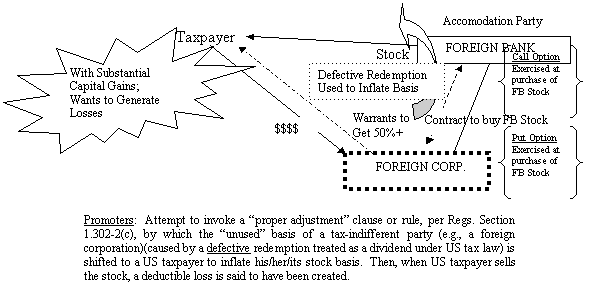LISTED TRANSACTIONS
Listed Transaction #13
(Abusive Basis-Shifting)
Abusive Basis-Shifting Devices
Foreign Leverage Investment Portfolio (FLIP)
Offshore Portfolio Investment Strategy (OPIS)
Notice 2001-45

In these settings, taxpayers with substantial capital gains are approached with a plan that will generate capital losses (to offset the gains). This transaction involves the use of certain attribution rules under IRC Section 318 and application of Regs. 1.302-2(c) to enable a taxpayer to increase the basis of stock owned and then dispose of this stock at a purported loss. In the transaction, a purported redemption of stock owned by a tax-indifferent party (e.g., a foreign party) is treated as a dividend under IRC Section 301 rather than as a payment in exchange for stock under IRC Section 302. A variety of devices (e.g., forward open contract, options, puts & calls) are employed to enable the redeemed shareholder to claim that it has continuing interests in the entity that is redeeming its stock. As a result of this concocted redemption, promoters advise taxpayers that they can rely on Regs. Section 1.302-2(c) to claim that all or a portion of the basis of the redeemed stock can be added to the basis of stock in the redeeming corporation owned by the taxpayer. Then, the taxpayer can sell the stock and claim a loss. A variation of the transaction might involve the transfer of the stock (with a higher basis) to an entity in some kind of carryover basis exchange (i.e., a Section 351 transaction), followed by either a sale of the entity interest or a sale of the stock by the entity.
The IRS is of the view that arrangements like those above do not produce an allowable loss. To be respected, a transaction must have economic substance separate and distinct from the economic benefit achieved solely by tax reduction. In determining whether a transaction has economic substance so as to be respected for tax purposes, both the objective economic substance of the transaction and the subjective business motivation must be analyzed. The IRS notes that courts have recognized that offsetting legal obligations, or circular cash flows, may effectively eliminate any real economic significance of the transaction. Correlation of losses to tax needs coupled with general indifference to, or absence of, economic profits may further reflect on a lack of economic substance. In other words, a close relationship between the original tax gain and the total purported losses suggests that a taxpayer did not enter into the transaction with a proper business purpose.
Note:
Regulations were issued in 2002 under Section 302 which completely overhauled the tax rules applicable to the disposition of a redeemed shareholder’s unrecovered basis. As a general rule, the unused basis will remain with the taxpayer who made the investment and eventually give rise to a deductible loss that only such investor can enjoy.
In a Coordinated Issue Paper, dated December 3, 2002, the IRS reviewed the transactions that are arranged by promoters and often marketed as either Foreign Leverage Investment Portfolio (“FLIP”) or Offshore Portfolio Investment Strategy (“OPIS”). The issues analyzed in this coordinated issue paper were:
- Whether the foreign corporation ever had an ownership interest in the shares of the foreign bank stock that were purportedly then redeemed?
- If the foreign corporation is treated as having owned the shares of the foreign bank stock, whether, under Zens, the foreign bank’s redemption of such stock is not treated as an exchange under Section 302(a) or a distribution under IRC Section 301?
- If the purported loss was a bona fide loss allowable under Code Section 165?
- Whether the taxpayer acquired control of the foreign corporation with a principal purpose of avoiding or evading Federal income tax to then disallow the loss under Code Section 269?
- Whether the at-risk provisions under Section 465 limit the capital losses claimed?
- Whether the transaction as a whole lacks economic substance and business purpose apart from tax savings?
- Should the IRS assert accuracy related penalties against the taxpayer?
- Should the TEFRA unified audit procedures apply to the adjustments in question?
These transactions are the subject of multiple civil suits. In addition, on June 24, 2005, a class action was commenced against KPMG and Sidley Austin Brown & Wood, seeking redress for damages caused to a class of taxpayers who purchased any FLIP, Offshore Portfolio Investment Strategy (“OPIS”), Bond Linked Issue Premium Structure (“BLIPS”), or Short Option Strategy (“SOS”) from January 1, 1996 through and including September 14, 2005 and who either consulted with or received written or oral advice from both KPMG and Sidley Austin concerning one of these transactions or filed a tax return relating to participated in the transaction, as more fully described in notices filed in that case. Simon v. KPMG and Sidley Austin Brown & Wood, Case No. 2:05-cv-03189 (D. N.J. 2006). Also, these transactions are covered and reported on extensively in Congressional reports, most notably, in the U.S. Senate PSI Report, “The Role of Professional Firms in the U.S. Tax Shelter Industry Report” (February 8, 2005).
If you believe that you may have engaged in a transaction that is the same or substantially similar to the transaction described above, Federal law may require you to disclose your and other parties’ participation in any such “listed transaction” on IRS Form 8886. For more information about Federal law requirements, please contact us.